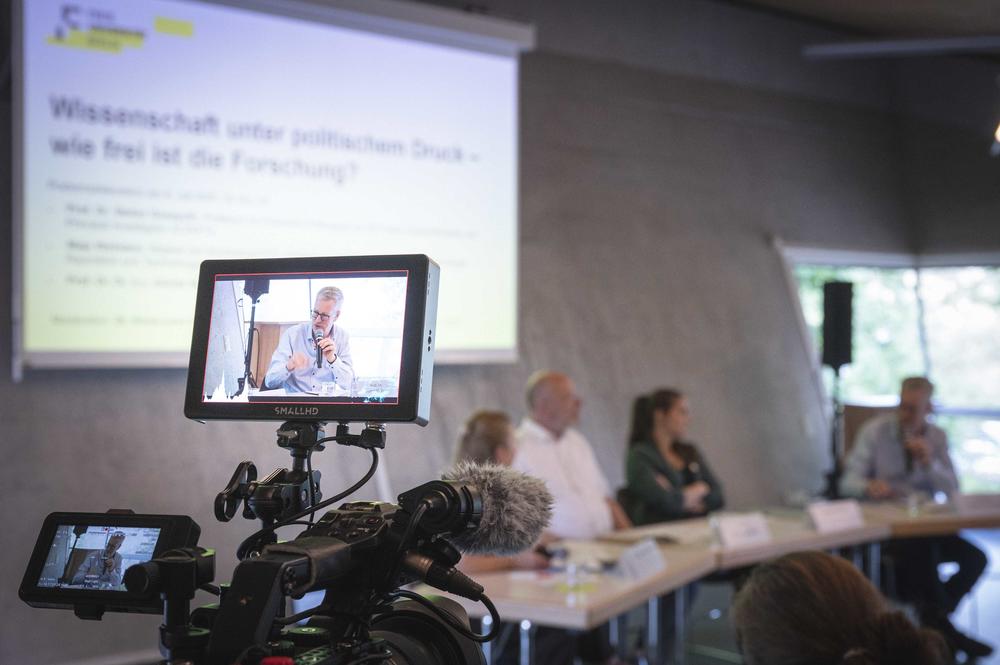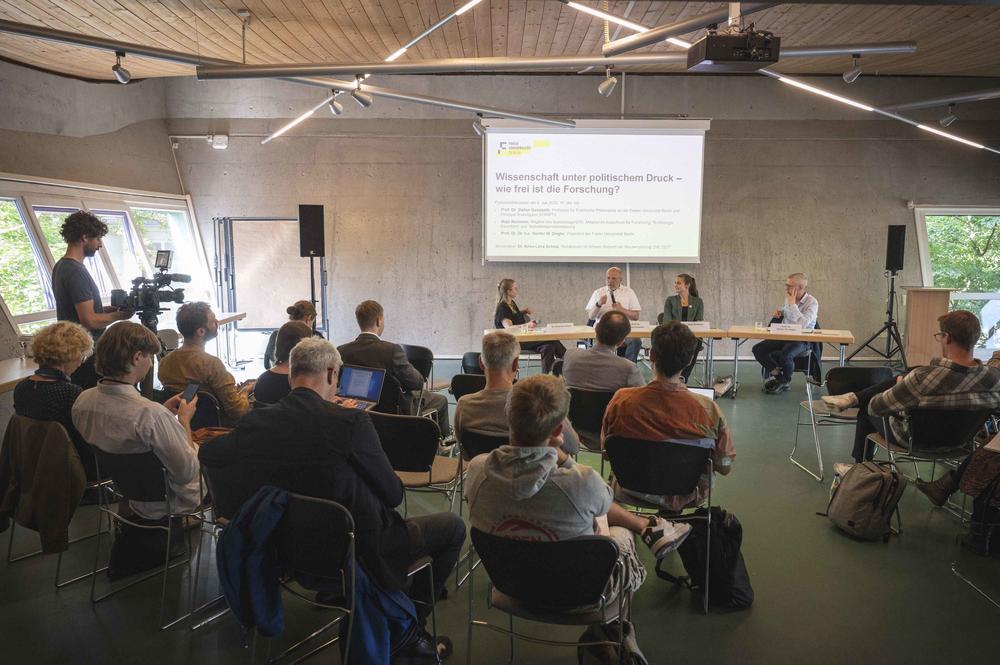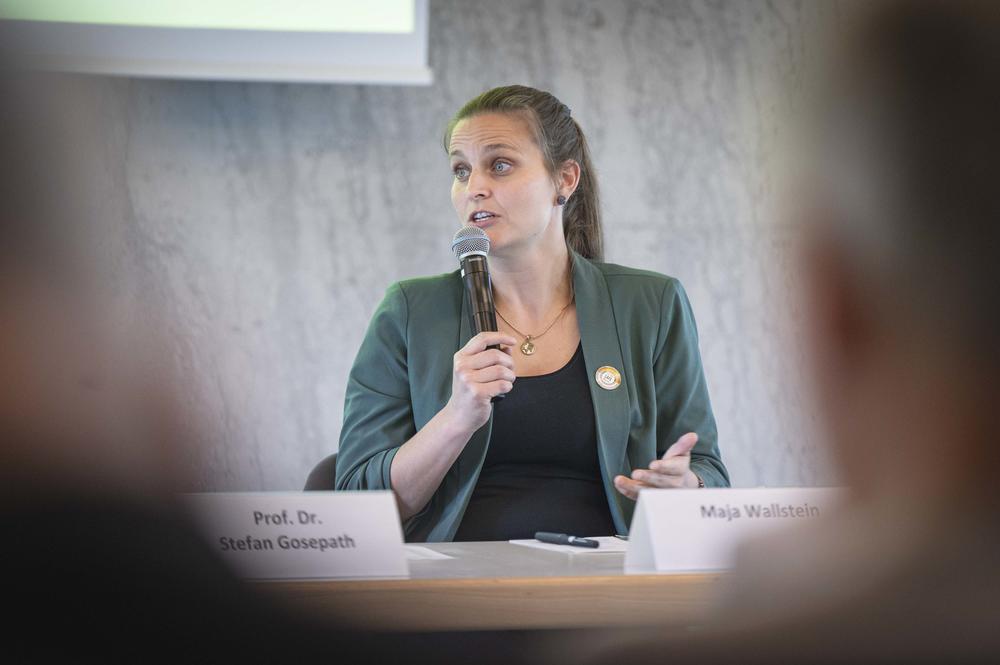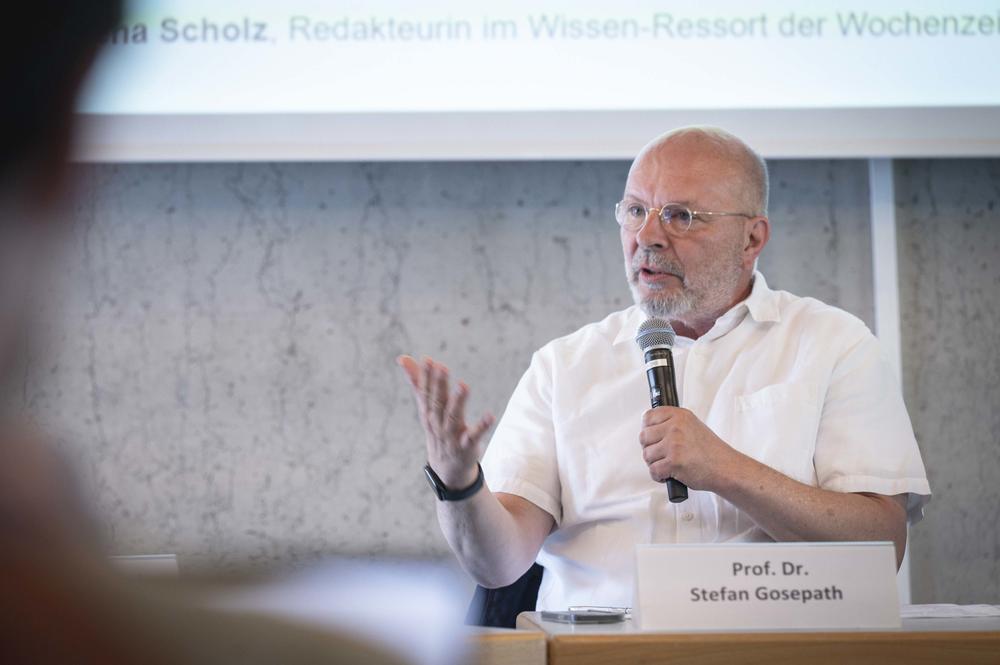“Truth and Freedom Are Closely Linked”
In the USA, the Trump administration is currently placing enormous pressure on universities. Could something similar happen in Germany? Representatives from politics and research discussed this issue at Freie Universität Berlin
Jul 30, 2025
The panel: President of Freie Universität Berlin Professor Günter M. Ziegler, Professor of Philosophy Stefan Gosepath, and Member of the Bundestag Maja Wallstein (Social Democratic Party of Germany, SPD). Moderator: Dr. Anna-Lena Scholz.
Image Credit: Bernd Wannenmacher
Günter M. Ziegler, president of Freie Universität Berlin, says he always keeps a small-print edition of Germany’s Basic Law at hand on his desk. He received the small book as a gift from Susanne Baer, a former judge at the German Federal Constitutional Court. Her dedication reads, “Always remember Article 5, Paragraph 3.” That is where academic freedom is enshrined in the German constitution: “Arts and sciences, research, and teaching shall be free. The freedom of teaching shall not release any person from allegiance to the constitution.”
Video Recording of Panel Discussion “Academia under Political Pressure – How Free is Research?”
In view of the current political situation in the United States, where the Trump administration is exerting enormous pressure on universities, this paragraph has rarely been more relevant.
Concerns about political influence on research and teaching are growing in Germany, too. On July 8, 2025, representatives from politics and research met at Freie Universität Berlin to discuss whether and how far this concern is justified. The panel discussion was staged to tie in with the Semester Focus on Academic Freedom.
The panel discussion was staged to tie in with the Semester Focus on Academic Freedom.
Image Credit: Bernd Wannenmacher
“I’m definitely concerned that we could see the developments in America come here, too,” commented Ziegler during the discussion. “We’ve already heard similar proposals from among the ranks of the AfD.” He was referring, for example, to the far-right Alternative für Deutschland (AfD) party’s group in the Bundestag requesting information on whether university research projects related to gender-sensitive language are being financed with federal funds. They also wanted to know which projects.
As far back as 2017, the AfD raised a similar question in the Berlin House of Representatives to gain an overview of gender studies professorships, students, and graduates in Berlin. The Thuringia branch of the AfD had previously filed a complaint against the WZB Berlin Social Science Center in reaction to a critical study.
Maja Wallstein, SPD Bundestag representative and member of the Committee on Research, Technology, Space, and Technology Assessment
Image Credit: Bernd Wannenmacher
Maja Wallstein, SPD Bundestag representative and member of the Committee on Research, Technology, Space, and Technology Assessment, is also keeping a watchful eye on the situation. “In Hungary, Viktor Orbán’s government has already imposed broad restrictions on the freedom of universities,” she said. “France, too, has faced calls to cut funding for unpopular EU-level research projects – and, interestingly, it’s not just right-wing populists who are voicing them, but also mainstream conservatives.”
The Trump administration is putting pressure on US universities, above all, by cutting federal funding. A similar drift cannot be ruled out in Germany. “If, one day, the AfD comes into government, it could restrict research by cutting funds,” Ziegler pointed out. “I can see that danger.”
Wallstein, whose electoral district Cottbus-Spree-Neiße swung to the AfD in the last Bundestag elections, warns that this kind of scenario could become a reality in the coming years.
Stefan Gosepath, Professor for Practical Philosophy at Freie Universität Berlin and Principal Investigator of the SCRIPTS Cluster of Excellence, suggested that the specific circumstances seen in the United States would not apply to Germany. “The debate in the USA revolves around the key issue of freedom of speech,” he explained. “Not around the freedom of research and teaching, which enjoys special protection in the German constitution.”
While freedom of speech safeguards the right to freely state personal opinions, academic freedom covers the free organization of research within the framework of general constitutional principles. “This concerns research methods and goals in equal measure,” Gosepath added. “Both are free in Germany – but need to be in line with legal as well as moral standards.”
Do the Berlin Senate’s Budget Cuts Represent a Threat to Academic Freedom?
Responding to this question, Ziegler underlined university autonomy as a key factor. “What type of research is conducted has to be decided by scholars and scientists,” he said. “The same goes for which research projects are financed.”
The panel went on to weigh whether the cuts proposed by the Berlin Senate represent a threat to academic freedom. The latest draft budget earmarks cuts totaling 250 million euros for Berlin research in 2025. Around 37 million euros will be slashed at Freie Universität Berlin.
“These cuts will massively restrict research and teaching at our university,” Ziegler said. “I am not accusing the Berlin Senate of mal-intent here. They do not have a political agenda against research. But the impact is still damaging.”
The panel members all agreed that academic freedom can only be guaranteed through sufficient funding. Stefan Gosepath noted that freedom is closely linked to the truth by summing up: “The search for truth has to be conducted in freedom. Otherwise, we will not find the truth.”
The original German version of this article appeared in campus.leben, the online magazine published by Freie Universität Berlin.




